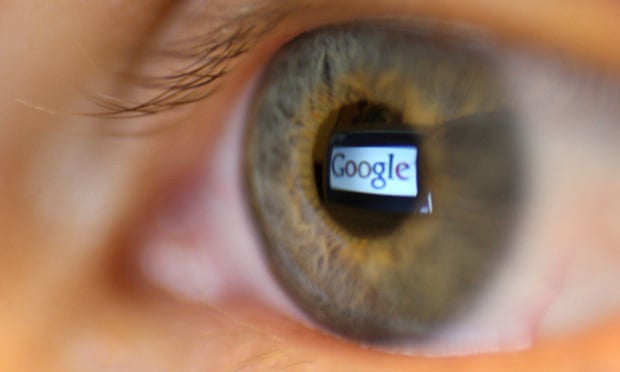Vodafone and trio of high street banks take action as industry and UK government ask how their ads became attached to extremist material
 Photograph: Dominic Lipinski/PA
Photograph: Dominic Lipinski/PA
The Google logo reflected in the pupil of a human eye
Sky, Lloyds, HSBC and RBS have joined McDonald’s and Audi in suspending advertising with Google
@ByRobDavies
Google executives are bracing for a two-pronged inquisition from the advertising industry and the government over the company’s plans to stop ads being placed next to extremist material.
A slew of big-name companies, advertising firms and government departments have either pulled their adverts from Google and its YouTube video site or are considering whether to do so, with media giant Sky, telecoms group Vodafone and a trio of banks adding their names to a growing list over the weekend.
The internet firm’s European head, Matt Brittin, is one of two Google executives due to speak at the annual Advertising Week Europe event, attended by major companies in the advertising world.
Sources said Brittin was likely to face a flurry of questions about how adverts for major brands ended up attached to videos by extremists, including hate preachers and former Ku Klux Klan leader David Duke.
The ads help fund payments to the people who post the videos, with every 1,000 clicks worth about £6. Experts estimate this could have been worth £250,000 to extremists.
Brittin will be among the first people to address delegates on Monday when speakers will also include Unilever’s chief marketing officer, Keith Weed.
Unilever declined to comment on whether it had suspended advertising through Google.
Leading advertising agencies have been quick to react, with French marketing firm Havas, whose clients include O2 and Royal Mail, pulling its adverts late last week. Publicis, the world’s third-largest advertising firm, said it was reviewing its relationship with Google and YouTube.
The world’s largest advertising firm WPP, via its media-buying division GroupM, has stopped short of cancelling ads but has written to major clients asking them how they wish to proceed.
GroupM’s chief digital officer, Rob Norman, told Sky News that Google should apologise publicly to companies whose reputation has been “compromised”.
Mark Howe, head of Google’s agencies business in Europe, the Middle East and Africa, will also speak at Advertising Week Europe. His responsibilities, according to a company biography, include ensuring that Google “builds lasting & trusted relationships with its customers”.
Brittin and Howe will be exposed to questions from advertising luminaries at the start of a week in which executives will have to explain themselves in a second meeting about the affair with government ministers.
In a letter to the company, Yvette Cooper, who chairs the home affairs select committee, accused the company of “profiting from hatred”.
And senior figures from Google were summoned to the Cabinet Office last week over concerns that taxpayer-funded adverts were appearing alongside “inappropriate” YouTube videos. Google executives apologised but were told to come back to the Cabinet Office this week with a plan and a timetable to remedy the problem.
The decision by Vodafone, Sky, HSBC, Lloyds and Royal Bank of Scotland to suspend their ads, or review whether to do so, follows action last week by other brands. They include McDonald’s, L’Oréal, Audi, Sainsbury’s, Argos and the BBC. Government spending has also been suspended while Tesco is understood to have “paused” spending on YouTube.
BT said: “We take our responsibilities as an advertiser seriously and have a robust set of safeguards in place to make sure our adverts don’t appear on websites or content which may be dedicated to offensive themes”
While Google is yet to reveal what it plans to do, it is understood that advertisers will be told that they may not be making enough use of existing tools and it will offer to provide advice on how companies can better use these.
However, Google is also expected to take a wider look at how ads are placed, including whether it has put enough checks and balances in place to avoid unfortunate juxtapositions.
“We’ve heard from our from our advertisers and agencies loud and clear that we can provide simpler, more robust ways to stop their ads from showing against controversial content,” Ronan Harris, managing director of Google UK, said last week.
The Guardian is among the organisations to have withdrawn its advertising. Ads for the Guardian’s membership scheme are understood to have been placed alongside extremist material after an agency acting on the media group’s behalf used Google’s AdX ad exchange, which uses an automated system known as programmatic trading.